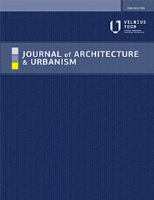
Journal of Architecture and Urbanism
metrics 2024
Innovating Architecture for Sustainable Cities
Introduction
The Journal of Architecture and Urbanism, published by VILNIUS GEDIMINAS TECH UNIV, stands as a pivotal resource for scholars and practitioners in the fields of architecture and urban studies. Since its inception in 2012, the journal has committed to advancing research and discourse on the design, planning, and functionality of urban environments, reflecting a dedicated focus on contemporary challenges in architecture and urbanism. With an impressive open access model implemented since 2018, it ensures that innovative research is accessible to a global audience, fostering collaboration and knowledge exchange. The journal boasts a commendable reputation, categorized in the Q2 quartile for Architecture and Q3 in both Geography, Planning and Development and Urban Studies as of 2023, while maintaining respectable Scopus rankings. Addressing key themes from sustainable design to socio-economic impacts on urban spaces, the journal aims to inspire new models and solutions that meet the evolving needs of growing urban populations. This is a must-read for anyone engaged in the intersection of architecture and urban development.
Metrics 2024
 0.21
0.21 0.60
0.60 0.60
0.60 12
12Metrics History
Rank 2024
Scopus
JCI (Web Of Science)
Quartile History
Similar Journals

ICONARP International Journal of Architecture and Planning
Fostering global collaboration in architectural scholarship.ICONARP International Journal of Architecture and Planning is an esteemed open-access publication that serves as a pivotal platform for fostering innovative research and discussions in the fields of architecture and urban design. Published by KONYA TECHNICAL UNIVERSITY, FACULTY OF ARCHITECTURE & DESIGN, this journal has been committed to the dissemination of high-quality academic work since 2013, promoting accessibility and global collaboration among researchers, professionals, and students. With its rigorous peer-review process and a focus on contemporary architectural and planning challenges, ICONARP seeks to contribute significantly to scholarly discourse and practical applications within the built environment. The journal is indexed in various scientific databases, enhancing its visibility and impact in the academic community. By appealing to a diverse audience, ICONARP encourages interdisciplinary studies and innovative solutions that address the complexities of modern architecture and urban living.

i2 Investigacion e Innovacion en Arquitectura y Territorio
Fostering interdisciplinary insights in architecture and territorial development.i2 Investigacion e Innovacion en Arquitectura y Territorio is a leading open-access journal published by the University of Alicante, dedicated to advancing research and innovation in the fields of architecture and territorial development. Since its inception in 2013, this journal has aimed to provide a robust platform for scholarly discourse, promoting interdisciplinary approaches that connect academic insights with practical applications in urban planning and environmental design. With its commitment to accessibility, the journal ensures that cutting-edge findings and case studies are readily available to researchers, professionals, and students alike, fostering collaboration and informed decision-making. As the landscape of architecture and geography continues to evolve, the i2 journal stands out as a crucial resource for enhancing knowledge and cultivating innovative practices in these dynamic fields.
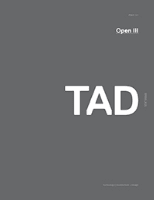
Technology-Architecture + Design
Shaping the Future of Design through TechnologyTechnology-Architecture + Design is a pioneering academic journal published by Taylor & Francis Ltd, dedicated to exploring the intersection of technology within architectural and design practices. With an impactful presence in the field since its inception in 2017, the journal has quickly ascended in academic rankings, achieving a Q2 categorization in Architecture and a notable Q1 ranking in Visual Arts and Performing Arts, underscoring its significance in these dynamic areas of study. The journal aims to provide an open platform for innovative research that addresses contemporary challenges in architecture and urban planning, utilizing technological advancements as a central theme. As a vital resource for scholars, practitioners, and students alike, Technology-Architecture + Design publishes high-quality, peer-reviewed articles that contribute to the discourse surrounding sustainable design, digital fabrication, and smart urbanism, making it an essential read for those passionate about the future of built environments.
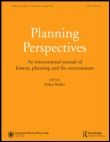
Planning Perspectives
Connecting Theory and Practice in GeographyPlanning Perspectives is a prestigious journal published by Routledge Journals, Taylor & Francis Ltd, focusing on the dynamic fields of geography, planning, and development. With an ISSN of 0266-5433 and an E-ISSN of 1466-4518, this journal has been a vital resource for scholars since its inception in 1986, exploring diverse theoretical and practical dimensions of spatial planning and policy. As a respected Q2 journal within its category, it ranks 498 out of 821 in the Scopus database, placing it in the 39th percentile. Its commitment to driving the discourse in planning practices makes it an essential read for researchers, professionals, and students seeking to deepen their understanding of planning systems and spatial development. While it does not offer open access, access options are available through institutional subscriptions, making it accessible to a wide academic audience. Through in-depth articles, reviews, and research findings, Planning Perspectives continues to influence and shape the future of planning studies.

Materia Arquitectura
Transforming ideas into impactful architectural practices.Materia Arquitectura, published by the Universidad San Sebastián, Facultad de Arquitectura y Arte in Santiago, is a leading open-access journal dedicated to the dynamic field of architecture. With its ISSN 0718-7033, this journal has established itself as a vital platform for disseminating cutting-edge research, innovative design practices, and critical discourse surrounding architectural theory and education since its transition to open access in 2017. The journal's commitment to fostering academic collaboration and knowledge sharing is reflected in its inclusive approach, welcoming contributions from researchers, practitioners, and students alike. By providing free and worldwide access to its content, Materia Arquitectura significantly enhances the visibility and impact of architectural scholarship, making it an essential resource for anyone invested in the future of architecture and design.
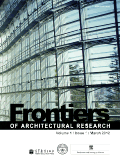
Frontiers of Architectural Research
Cultivating Insightful Research for a Sustainable Built EnvironmentFrontiers of Architectural Research, published by KEAI PUBLISHING LTD, stands at the forefront of interdisciplinary scholarship, addressing contemporary challenges in the fields of architecture, urban studies, building and construction, and archaeology. Since its establishment in 2012, this open-access journal has rapidly gained recognition, achieving prestigious rankings in the 2023 category quartiles, including Q1 placements in both Architecture and Archaeology. With an impressive Scopus rank of #5 out of 354 in Archaeology and #10 out of 189 in Engineering - Architecture, it demonstrates its significant influence and contribution to advancing architectural research. Frontiers of Architectural Research embraces a broad scope that fosters innovative discourse and practical solutions, catering to a diverse audience of researchers, professionals, and students keen on exploring the intersection of culture, environment, and technology. By ensuring immediate access to research findings, the journal not only enhances the visibility of scholarly work but also encourages collaborative dialogues that shape the future of architectural practice.

Dearq
Advancing Knowledge in Architecture and Urban StudiesDearq, an esteemed academic journal published by UNIV ANDES, is recognized as a vital source of knowledge in the fields of Architecture, Geography, Planning, and Urban Studies. As an Open Access journal since its inception in 2007, it provides researchers, professionals, and students with a platform to disseminate high-quality research that fosters innovation and progress in these dynamic disciplines. With an impressive track record of converging research from 2019 to 2024, Dearq currently holds a Q2 ranking in Architecture and Q3 rankings in both Geography, Planning, and Development, as well as Urban Studies for 2023. This editorial momentum reflects its commitment to advancing scholarly dialogue and critical inquiry. Located in Colombia and fostering a global perspective, Dearq is dedicated to enriching the academic landscape, making it an indispensable resource for anyone seeking to explore and understand complex socio-environmental issues.

Landscape Architecture and Art
Celebrating the Fusion of Ecology and Visual ArtsLandscape Architecture and Art is a distinguished journal published by the Latvia University of Life Sciences and Technologies, specializing in the intersection of landscape architecture, environmental design, and the visual arts. Established in 2016, this journal has rapidly garnered recognition in various academic categories, achieving Q3 ranking in Agricultural and Biological Sciences (miscellaneous), Q4 in Geography, Planning and Development, and notably Q1 in Visual Arts and Performing Arts as of 2023. With its ISSN 2255-8632 and E-ISSN 2255-8640, the journal provides an essential platform for researchers, professionals, and students to explore innovative approaches and sustainable practices in landscape design and conservation. Although currently not open access, the journal's commitment to high-quality research is evident through its impressive Scopus rankings, particularly in the Arts and Humanities with a commendable 88th percentile for Visual Arts and Performing Arts. Located in Jelgava, Latvia, this journal serves as a vital resource for advancing knowledge and fostering collaboration in the fields of landscape architecture and environmental stewardship.

Landscape Architecture Frontiers
Fostering interdisciplinary collaboration for a greener tomorrow.Landscape Architecture Frontiers, an esteemed journal published by Higher Education Press, serves as a pivotal platform for the dissemination of innovative research and critical thinking within the field of landscape architecture. Recognized for its commitment to advancing global discourse on sustainable design, environmental stewardship, and urban ecology, the journal's content is crucial for researchers, professionals, and students alike who are dedicated to shaping the future of landscape architecture. With a diverse range of topics covered, including landscape planning, restoration ecology, and cultural landscapes, this journal aims to foster interdisciplinary collaboration and promote best practices in the discipline. Although specific metrics like the impact factor and HIndex are not provided, the journal's reputation within the academic community underlines its significance in contributing to ongoing education and professional development in landscape architecture. For those interested in open access options, Landscape Architecture Frontiers encourages engagement and wider readership through its research, making it an essential resource for anyone passionate about the transformative power of landscapes and public spaces.
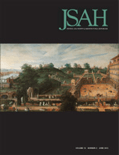
JOURNAL OF THE SOCIETY OF ARCHITECTURAL HISTORIANS
Exploring the Intersection of Past and Present in ArchitectureJOURNAL OF THE SOCIETY OF ARCHITECTURAL HISTORIANS, published by the SOCIETY OF ARCHITECTURAL HISTORIANS, serves as a premier platform for the dissemination of scholarly research and critical discourse in the fields of architecture and architectural history. Established in 1970, this journal has undergone significant evolution, focusing on interdisciplinary studies that explore architectural heritage, theory, and practice. With a current impact factor that places it within the Q2 category in both History and Visual Arts and Performing Arts, as well as Q3 in Architecture, the journal maintains a robust reputation among academics and professionals alike. Although it operates under traditional access models, its essential role in fostering a deep understanding of architectural narratives and their socio-cultural contexts remains unparalleled. The journal also ranks favorably in Scopus, highlighting its importance in the arts and humanities, as well as engineering disciplines related to architecture. By bridging the gap between historical inquiry and contemporary architectural criticism, the JOURNAL OF THE SOCIETY OF ARCHITECTURAL HISTORIANS continues to be a vital resource for researchers, professionals, and students endeavoring to enrich their knowledge and contribute to this dynamic field.